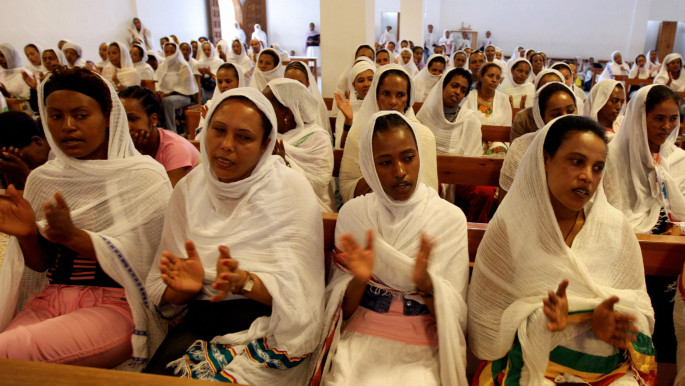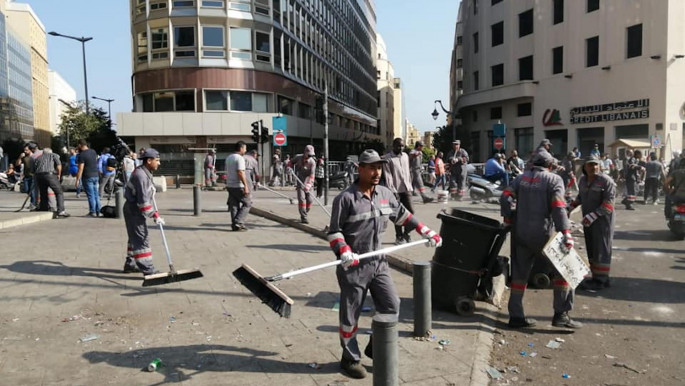'Discarded like trash': Ethiopian domestic workers abandoned by employers as Lebanon's economy flatlines
Over the past few weeks, scores of Ethiopian women have been camping on the street outside of their country's consulate in Beirut, abandoned by their Lebanese employers who can no longer afford to pay them.
Carrying little or no money, some are lucky just to have been given time to pack their belongings. Others do not even have a change of clothes or passports with them.
"They are dumping us like trash," one worker who had been in Lebanon for seven years told the Associated Press. "We are human. Would they accept it if their children were treated this way?"
Left by their bosses and with the embassy closing its doors to its own citizens, more than one hundred Ethiopian housemaids have been left stranded with nowhere to go and no money to return home.
The Ministry of Labour pledged it would conduct an investigation and prosecute any employers found to have committed violations. Those "who left migrant workers stranded in front of the consulate will be punished by law and will be placed on a blacklist that prevents them from hiring foreign domestic workers again," Labour Minister Lamia Yammine annonced in early June.
Facing unemployment, and with their salaries withheld, thousands of migrant domestic workers in Lebanon are unable to go back to their countries as they cannot afford the price of repatriation in the midst of a crippling economic and financial crisis, exacerbated by coronavirus restrictions.
 |
Scores of Ethiopian women have been camping on the street outside of their country's consulate, abandoned by their Lebanese employers who can no longer afford to pay them |  |
Among some estimated 250,000 registered migrant labourers in the Middle Eastern country, there are at least 180,000 domestic workers - with thousands more undocumented - the majority of whom are women from Ethiopia working in private households.
Maids, nannies and carers are recruited under the infamous kafala sponsorship system, often likened to modern-day slavery, which ties their legal residency to one employer, making it extremely difficult for them to end the work contract.
The system exposes workers to different forms of abuse, from exploitation, denial of rest days and the non-payment of already low wages, to forced confinement, restricted communication and food deprivation. Verbal, physical and sexual harassment is also common.
 |
|
| Read more: Trapped in Lebanon: Fears of abuse for migrant domestic workers amid Covid-19 lockdown |
These women choose to work and live with families so they can send money back home, however, all too often they end up with abusive employers.
"It's not uncommon that domestic employees don't get paid for months. Some haven't been paid for years even," Tsigereda Birhanu, a former housemaid who currently volunteers as coordinator at Egna Legna, an organisation supporting Ethiopian domestic workers in Lebanon, told The New Arab.
"Days ago, I encountered a girl who hasn't seen a dollar from her boss since she arrived from Ethiopia three years ago," the labour activist continued, arguing that many Lebanese are using the current crisis as an excuse not to pay their workers.
Employers typically confiscate passports and withhold wages as a common form of coercion. While in the past they could use the withheld pay to purchase the air ticket for workers asking to be sent home, now they cannot afford the ticket price due to the country's unprecedented foreign currency crisis.
Many migrants have not received their salaries since last October, after the dollar shortage sparked mass protests amid a worsening economic outlook that has seen the Lebanese pound lose around 70 percent of its value in recent months. Most of these workers are paid in local currency but send remittances home in US dollars, meaning their earnings have lost most of their value.
"The Lebanese government cannot ignore their plight. Under the kafala system, not only are their rights restricted but their lives are endangered as well, particularly as reports of abuse in the home have increased during confinement," Heba Morayef, Amnesty International's MENA Regional Director, said in a statement.
 |
Domestic workers are recruited under the infamous kafala sponsorship system, often likened to modern-day slavery |  |
"The issue of migrant domestic workers is linked to the crisis. The Lebanese have far less purchasing power, many are losing their jobs, and they no longer have access to dollars," Zeina Mohanna, programme coordinator for migrant workers and counter-trafficking at Amel, a Beirut-based NGO, told The New Arab.
Birhanu pointed out that hardly any Ethiopian maids want to stay in Lebanon, with no work and no place to live. She added that the stranded women are willing to give up on years of salary to return to their homeland.
"All those [women] I've spoken to want to leave. They would tell you 'I don't need to get my money, I just want to go back home!'" the Egna Legna activist said.
The embassy has declined to house the abandoned workers in its own shelter while ignoring phone calls and requests for comment. The repatriation costs for Ethiopian citizens in Lebanon amount to $1,450 including fights ($680) and 14-day quarantine expenses upon arrival, which makes it inconceivable for these women, who earn as little as $150 per month, to cover the return journey.
 |
|
| Read more: Imprisoned, starved, abused: The plight of domestic workers in Lebanon |
Employers, although legally bound to pay for their flights home, do not have the means nor US dollars in cash to bear the cost anymore. Repatriation efforts have been further hampered by the coronavirus lockdown, with the airport closed since mid-March.
Earlier this month, the Lebanese Ministry of Labour provided provisional accommodation for a first group of 37 Ethiopian domestic workers who had been sleeping outside their consulate for several days without being allowed entry. After spending a night in the temporary hotel, they tested negative for Covid-19 and were transferred to a shelter facility run by charity organisation Caritas.
More women were dropped off at the consulate's doors the next day as the word spread. For the second group of 28 Ethiopians, volunteers raised funds to cover their hotel stay, partly paying from their own pocket. Within a couple of days, another few dozen women gathered on the side of the road. The Ethiopian community and some of their local contacts secured accommodation for the third batch of domestic workers.
 |
Ethiopian domestic workers are victims of a double injustice - exploited by their bosses and then kicked out of their workplace |  |
But workers continue to be thrown out by their employers. On Tuesday 16 June, which incidentally was International Domestic Workers Day, around 18 new women were reportedly seen in front of the consulate.
Ethiopian domestic workers are victims of a double injustice. Not only were they exploited by their bosses, but they are now being kicked out of their workplace with no shelter and protection.
Mohanna explained that finding shelter is only the first step in a lengthy process that involves getting them off the streets, providing them with food and basic necessities, opening a legal file, investigating the non-payment of salary and dismissal, and eventually placing the employers on a blacklist that bans them from employing foreign domestic workers again.
One finding that Amel has observed among the Ethiopian women is that there has been a rise in mental health-related problems as a result of the lockdown measures.
 |
|
| Read more: Lebanon's unseen Bangladeshi migrant workers revolt for basic rights |
"We've come across more cases with mental issues than usual. Lebanese families have been stressed while staying at home for a long period of time with a psychological fallout, which has led to an increased rate of abuse against their employees," Amel's project coordinator acknowledged.
The mental health state in which these migrant workers are found reflects the hardships they have gone through during their stay in Lebanon with extra stresses brought about by the economic crisis and coronavirus.
Amel along with other local NGOs are lobbying Ethiopian Airlines to lower their prices to facilitate the return of the women and trying to collect funds to cover tickets while pressing employers to pay for their flights. Lebanese associations are also calling on the Ethiopian embassy to open its shelter space on site and are appealing to the Ethiopian government to ensure a good system of reception for its citizens upon their return.
Aya Majzoub, the Lebanon researcher at Human Rights Watch (HRW), emphasised that the Ethiopian embassy has been "uncooperative". Ethiopian Airlines has set an inflated price for tickets, and the Ethiopian government mandated a quarantine whose costs have to be borne by its nationals.
"Ethiopia is not just dismissing the plight of its own people but it's making it even more difficult," she said.
The researcher said that HRW is urging the Lebanese government to establish a "quick repatriation and justice mechanism" for migrant domestic workers who are stranded in the country through which repatriated workers can "seek redress for labour and human rights violations", and can also claim salaries and compensation they did not receive.
 |
It's not uncommon that domestic employees don't get paid for months. Some haven't been paid for years |  |
The kafala system leaves foreign domestic workers outside the remit of Lebanese labour laws as they are contractually bound to a local sponsor with which they sign the Standard Unified Contract after their arrival in Lebanon.
Not only does it exclude them from basic safeguards, it grants the employer excessive authority over the worker, and prohibits the employee from revoking the agreement without the sponsor's approval. Ending sponsorship without the latter's consent automatically turns the migrant worker into an illegal resident.
Efforts have been made to dismantle the inhumane system in Lebanon. In July of last year, a working group headed by the International Labour Organization (ILO) was formed by the former minister of labour. HRW, which participated in the working group, sent the minister its recommendations for changes in July of last year.
Nonetheless, the minister resigned soon after the start of nationwide protests, before he had a chance to carry out the reforms.
Alessandra Bajec is a freelance journalist currently based in Tunis.
Follow her on Twitter: @AlessandraBajec


![President Pezeshkian has denounced Israel's attacks on Lebanon [Getty]](/sites/default/files/styles/image_684x385/public/2173482924.jpeg?h=a5f2f23a&itok=q3evVtko)



 Follow the Middle East's top stories in English at The New Arab on Google News
Follow the Middle East's top stories in English at The New Arab on Google News


